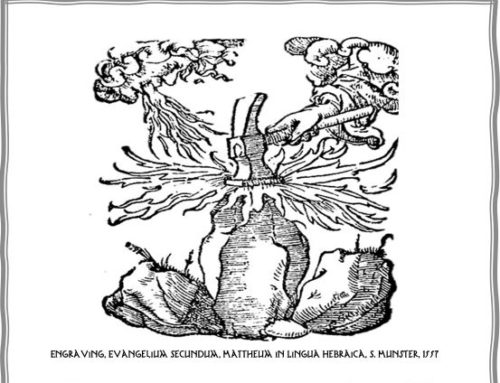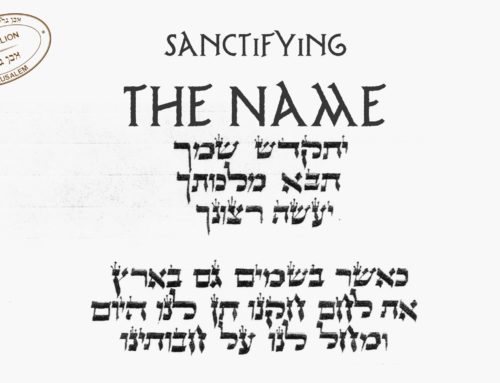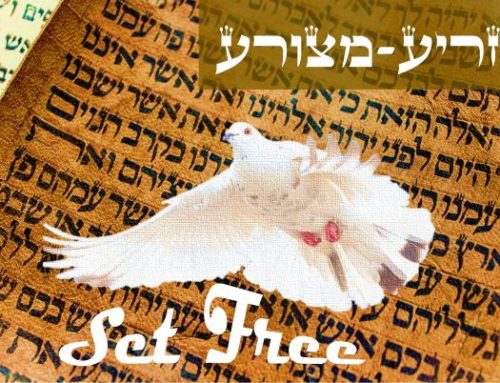Torah Portion Toldot (Genesis 25.19- 28.9, Malachi 1.1-2.7)
“Isaac prayed to the Lord on behalf of his wife, because she was childless. The Lord answered his prayer, and his wife Rebekah became pregnant. The babies jostled each other within her, and she said, “Why is this happening to me?” So she went to inquire of the Lord.” Gen. 25. 21-22 NIV
Isaac’s prayer for Rebekah has been compared to a man who took a pitchfork to his threshing floor and proceeded to turn over the grain, reverse the order, and remove obstacles. This interpretation comes from the unique Hebrew word vaye’tar (וַיֶּעְתַּר יִצְחָק לַה) used to describe his prayer. Vaye’tar is linguistically connected to a shovel or pitchfork, vahehtar.[1]
“Why is the prayers of the righteous symbolized by a shovel (the root עתר being used for praying…) As the shovel turns the grain from place to place, so the prayer of the righteous turns the dispensations of the Lord from anger to mercy…” Jastrow, A Dictionary, pg. 1130.
For twenty years Isaac and Rebekah struggled to conceive. After so long, they carried the diagnosis – barren. Prayer was not their last resort. They likely prayed many times before. What made this prayer different? Genesis introduces us to this new word for prayer because their desperation brought them to deeper level of intensity – prayer likened to a shovel clearing the way – digging the breach.[2] What is prayer, and are all prayers the same? Why do we instinctually believe that God is both listening to our prayers and that we can also discern the voice of our Creator? His prayer was like a winnowing fork heaping up words, moving obstacles, and overturning circumstances in his life. But we see that Isaac also had a prayer partner. Rebekah stood beside him as he called on the Lord, and she also prayed. This praying couple’s example demonstrates prayer that moves mountains.
I. Prayer that Moves Mountains
Vaye’ter speaks volumes about the prayer of Isaac. It describes effective prayers which God answers. Secondly it speaks of power, fervency, and abundance. Ezekiel used this verb to describe the thickness of smoke from burning incense. (Ezek. 9. 11) But this is not to be confused with the incense itself, but rather the ‘abundance’ of the incense. This same verb describes the “multiplied words” in Ezekiel 35.13. In Isaac, we see a positive demonstration of vaye’ter as the abundant, effectual, fervent prayer of a righteous man.[3] When it says Isaac prayed, it describes his abundant, multiplied words, heaped to God for Rebekah to conceive.
The New Testament book of James describes the effective, fervent prayer of a righteous man in relation to healing. This is also how ancient Hebrew commentaries describe Isaac’s prayer. Isaac is a righteous man whose abundant prayers, like a winnowing fork overturning grain in the threshing floor, overturned a decree of barrenness.[4] Could James be referencing not one, but two exemplars, in his chapter on the prayer of faith – Isaac, a righteous man whose abundant prayer was answered with healing, and Elijah who prayed that it might rain?
“Therefore confess your sins to each other and pray for each other so that you may be healed. The prayer of a righteous person is powerful and effective.” James 5. 16 NIV
“Elijah was a human being, even as we are. He prayed earnestly that it would not rain, and it did not rain on the land for three and a half years.” James 5. 17 NIV
Isaac’s prayers not only moved mountains of words on Rebekah’s behalf, his prayers removed a mountain of despair from Rebekah’s shoulders.
II. Prayer That Breaks Through
“Isaac prayed to the Lord on behalf of his wife…” Gen. 25. 21 NIV
A shovel overturns, but it can also make a breach. This is the kind of verb describing Isaac’s prayer. How do we pray break through prayers? Genesis paints Isaac and Rebekah as a praying couple. The verse above translated “Isaac prayed…on behalf of his wife”, can equally be translated “in the presence of his wife”.[5] I believe she was stood beside him as he heaped his petition to God. For twenty years, Rebekah struggled to conceive, and now she is called “barren”. It is amazing how others label us. Esau was called red because of his complexion, and the stew he loved. Rebekah was simply “barren”. How do we overturn a diagnosis? Through prayer! Isaac came from a praying family, but the word used to describe Isaac’s prayer is unique. Abraham’s prayer for others is described by the common word palal, meaning to pray. Isaac’s prayer, sometimes rendered as entreated or pleaded, might be put in modern vernacular as “prayed through”.
Have you heard the term “praying through”? This is a “travailing prayer”, a burden so heavy that you dared not stop praying until release and assurance comes that God has heard your prayer. Isaac came to that place of praying through.
Like a shovel breaching barriers, Isaac got down to business in prayer to God. I believe he made sure his sin was out of the way, and that he was walking right with the Lord. Yeshua, the Messiah, warned us that obstacles to prayer do exist. There are the obstacles of meaningless words (Mt. 6.7), unforgiveness (Mk 11.25), praying to yourself (Lk. 18.11), and praying to be seen, (Mt. 6. 5-6). These are but a few of the hinderances to prayer. Isaac prayed through until the moniker of barren fell from Rebekah. Now our text turns to the second half of our praying couple. Rebekah’s prayer is described using a different Hebrew word.
III. Prayers that Mold Generations
“God shapes the world by prayer. Prayers are deathless. The lips that uttered them may be closed in death, the heart that felt them may have ceased to beat – but the prayers live before God, and God’s heart is set on them, and (so) prayers outlive the lives of those who uttered them; outlive a generation, outlive an age, outlive a world.” E. M. Bounds on Prayer, 172
Sometimes we get more than we asked in prayer. Such was the case with Rebekah. This was her first pregnancy, but she knew that something was not right.
“The babies jostled each other within her, and she said, ‘Why is this happening to me?’ So she went to inquire of the Lord. The Lord said to her, ‘Two nations are in your womb, and two peoples from within you will be separated; one people will be stronger than the other, and the older will serve the younger.’” Gen. 25. 22-23 NIV
Not two babies – two nations struggled in her womb. Rebekah inquired (darash) the Lord on their behalf and received a word of prophecy impacting the world till today. What is the effect of your prayers? Perhaps you look back on mercies of grace that only came because someone prayed. Rebekah prayed differently from Abraham or Isaac. This word darash, means enquire, search, seek. Rebekah discerned in prayer that the older child would serve the younger, and so it was. She invested in Jacob because God showed her his destiny. Her prayers sustained the entire Middle East with food through her youngest, Jacob’s son, Joseph. Her prayers, bottled in heaven, are still impacting Israel and your life today. Oh, for a praying mother in Israel! Oh, for a praying mother or father in the home. Generations depend on your prayers. Not only do prayers move men, they move God.
IV. Prayers that Move the Heart of God
The modern media mocks the one who prays. They ridicule prayer as a quaint but affecting little change. The modern religious mantra is “prayer changes me”. The Bible, however, reveals that prayer moves the heart of God. One of the worst kings of Judah was Manasseh, synonymous with evil. Most people leave his story in his abject failure, having received a decree of judgment, and carted in chains to Babylon, but the book of II Chronicles tells us the rest of the story. Three times it says Manasseh prayed. God was moved by his prayer! (II Chron. 33.13,18,19)
Can the prayer of a wicked man move God? The prayer of a repentant man does move God.
“In his distress he sought the favor of the Lord his God and humbled himself greatly before the God of his ancestors. And when he prayed to him, the Lord was moved by his entreaty (v’he’ater) and listened to his plea; so he brought him back to Jerusalem and to his kingdom. Then Manasseh knew that the Lord is God.” II Chron. 33. 12-13 NIV
Why am I mentioning Manasseh in the story of Isaac and Rebekah? Not simply because he prayed, his entreaty in the verse above is described using the same unusual Hebrew root word revealed in Isaac’s breakthrough prayer. Manasseh’s prayer and repentance moved God to mercy.
Conclusion
Manasseh prayed like a man shoveling a mountain of sin to get to God. Rebekah sought the Lord as a mother of destiny, and Isaac prayed prayers that opened a closed womb. You are uniquely designed for prayer and communion with the one true God of Israel. We discussed three kinds of prayer, palel, vaye’tar, and darash, each with a different emphasis. Sometimes the answer only comes through prayer and fasting. The intense, prayer that moves obstacles to reach God. Perhaps the greatest obstacle we will face is ourselves. May we know that kind of prayer in these days not only for our moment in history, but for the generations to come.
Shavua Tov from Zion
[1] Marcus Jastrow, A Dictionary of the Targumim, the Talmud Babll and Yerushalmi, and the Midrashic Literature Compiled by Marcus Jastrow: With an Index of Scriptural Quotations, vol. II (Israel, 1972), 1130.
[2] Ibid, 1129.
[3] Bereishit Rabbah.63. 1
[4] Bereishit_Rabbah.63. 5
[5] John Gill, “Genesis 25 Commentary – John Gill’s Exposition on the Whole Bible,” StudyLight.org, accessed November 16, 2020, https://www.studylight.org/commentaries/geb/genesis-25.html. “And Isaac entreated the Lord for his wife: As is observed by Jarchi; or, “before his wife”F1, she being present, and joining with him in his prayers…”





